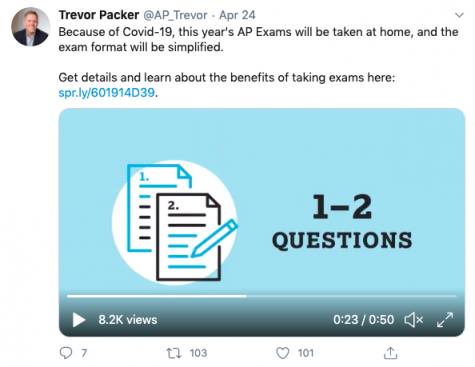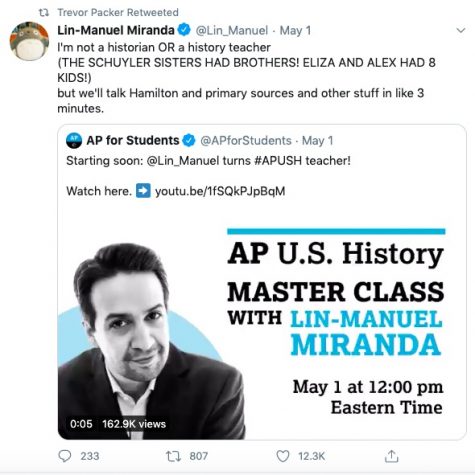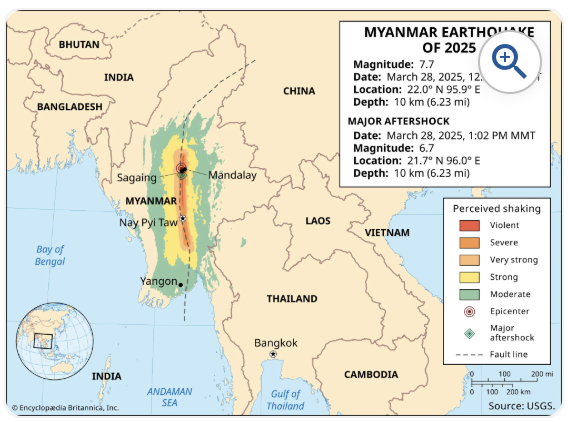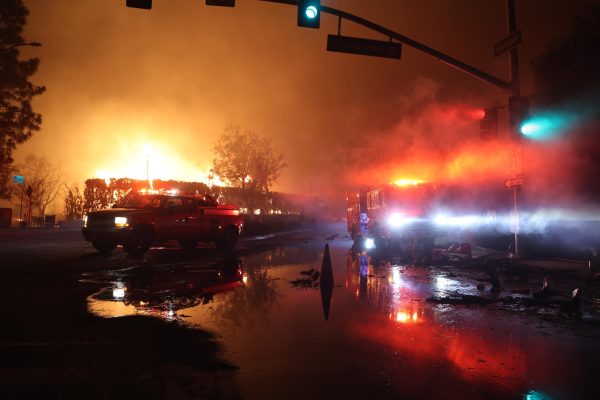Along with the Rest of Education, AP Exams Go Virtual
In response to the nationwide closure of schools due the COVID-19 pandemic, CollegeBoard transformed its Advanced Placement (AP) Exams, taken by upwards of five million high school students globally each year, to a condensed online format. Instead of the typical exam structure where each exam is over three hours long and takes place around the world at 8 AM or 12 PM local time, this years’ exams were open-book 45-minute ordeals occurring at the same time for every examinee, regardless of time zone.

Another major change to the exams this year was the elimination of all multiple-choice questions in an effort to avoid cheating; all responses were free-response. The responses were able to be typed, handwritten, or, in the case of the foreign language exams, spoken into an app on a mobile device.
CollegeBoard created these new exams in just over seven weeks; its first announcement regarding the cancellation of in-person exams came on March 20 by senior vice president of AP and Instruction at CollegeBoard Trevor Packer, and the first exams began on May 11. Although all of the exams were 45-minutes in length, some contained one question (AP English Literature) while others contained two questions (AP Statistics).
Students and teachers of the twelve non-portfolio based AP courses offered at MBS had mixed reactions to the seismic shift from the arduous exams in Kirby Chapel to the comparatively light exams taken at their homes.
The exams were more favorable specifically for MBS students as they have more experience with long written responses than students who attend larger schools that employ mostly objective assessments. Tim Schietroma ‘21 explained that “the excellent writing skills which we gain at Morristown-Beard … allowed me to relax and be more comfortable during the exam.”
Ali Stecker ‘20 agreed, explaining, “I was kind of excited for the change because I do not like multiple-choice on standardized exams. I find that the grading is somewhat more lenient with free-response because they can see your thought process and understanding of the material.”
AP English Literature teacher Ms. Nikolin Eyrich said, “I was pleased that it was going to be an essay, because to me, that is a more accurate way of assessing the skills we learn and refine over the course of the year.”
Terry Luongo ‘21 added, “I am not going to complain at all because I saved approximately six hours of time taking three APs online rather than in person.”
On the other hand, many were concerned with the length and scope of the new exams. Hannah Blake ‘21 put it quite simply: “It’s impossible to test a year’s worth of knowledge in 45 minutes.”
Kim Magnotta ‘21 elaborated, “Although I prefer short-answer style questions, I was disappointed upon the discovery that one question would determine my entire AP score [referencing AP US History and English Language]. It also seemed unfair because an entire year’s work would now be determined by the performance on one question, in a 45-minute time frame.”
To alleviate concerns of teachers who had not finished covering material in their AP classes before the shutdown, CollegeBoard announced it would not test the last quarter of the material prescribed in most AP courses. Often, the material covered in the last quarter of an AP course is a culmination of material from earlier in the year, requiring students to pull together concepts learned earlier in the course and apply them to new situations. Therefore, many were saddened that material taught late in the course would not be assessed, such as AP Chemistry teacher Dr. Janet Berthel, who explained she felt “concern and disappointment for my students. I was disappointed that students weren’t given a chance to demonstrate their mastery of some very valuable topics.”
In addition, some expressed concern with the format of the exams. Mr. Roger Richard, Interim Dean of Faculty and AP US History teacher explained, “I feel that the time allotted for writing was too brief and the skill sets measured were too narrow.” For AP US History, the exam consisted of one document-based question focused only on the years 1754 to 1945 (the normal exam covers material from 1491 to the present). In this prompt, students were asked to craft a cohesive essay incorporating at least four of five provided documents as well as additional knowledge learned in the course.
The length of the exams, despite their intent to test a smaller scope of knowledge, was certainly on the mind of students. CollegeBoard purposely made the tests proportionally longer to the time provided than usual to test as many concepts as possible and prevent students from relying too heavily on notes.
As students waited to take their exams, a message flashed across the screen reassuring them to submit their work when the allotted five-minute period began, as they could still earn a passing score regardless of whether they completed all parts of the question.
Students were still surprised by the length of the exams. Blake explained, “I knew they would be long, but I was not expecting parts A-L [12 parts] in 25 minutes.” Hashtags on Twitter revealed that students national wide were feeling similarly. “AP Bio exam be trying to teach the whole dang alphabet again” became a popular meme almost immediately after the exam administration.
Stecker said, “I did make ‘cheat sheets’ with formulas but I didn’t even have time to use them.” With some questions having 12 parts, it was difficult for many to get through entirely.

Although the shift to distance learning and online exams posed many challenges, preparation methods were actually ameliorated by these changes. Mrs. Kelly Mauger, who teaches AP Calculus AB, said, “CollegeBoard was very supportive of teachers and students during the review process. In the case of AP Calculus AB, two teachers hired by CollegeBoard, Virge [Cornelius] and Mark [Kiraly], had daily 45 minute reviews streamed on the CollegeBoard YouTube channel.” She continued, “I assigned many of Virge and Mark’s videos and the supplemental material that went along with them. We discussed the videos and examples in our Zoom sessions. Had we been in class, there would have been no Virge and Mark videos.”
Richard utilized Google Classroom, which will be unrolled for all MBS classes in the fall, to help his AP US History students prepare. He said, “distance learning allowed me to use Google Classroom to a greater extent by being able to see student writing in real-time and provide feedback in real-time. So, the greater reliance on technology actually enhanced the learning process.”
Students and teachers agree that the free-response format of the exams was a very positive aspect of the online exams and continuing it should be considered. Luongo explained, “Because of the online format, the test relied more on critical thinking skills and close reading ability rather than the ability to ‘crunch the numbers.’”
Eyrich expanded, “I think this situation presents the CollegeBoard with a moment for reflection. They assigned free-response questions that require transference of skill–that is to say that students learn a concept and then have to apply it.” She then asked the question many opponents of multiple-choice exams now pose: “If free-response exams work, is returning to multiple-choice really necessary?”
One of the many reasons students take AP classes is that earning a passing score on the exams can allow students to earn college credit or place out of introductory courses. CollegeBoard repeatedly assured students that they would receive credit for the modified exams, even making a video with college admissions officers claiming they would treat these exams the same as they would any other year, but some students still have doubts. Magonotta remarked, “Now that the AP exams are completed, my concern is whether or not colleges will give credit for these classes, considering this unique testing format.”
Some students had issues submitting their exams, but they were able to sign up for makeup exams the week of June 1. Following an uproar of complaints from students who completed their exams only to have to retest because of submission issues, in the second week of the original exams, CollegeBoard allowed students to email their responses to an individualized address if a technical issue occurred. However, the impact of not having a secondary submission option was substinative, and a $500 million lawsuit has been filed against CollegeBoard regarding submission issues.
Despite the many concerns, millions of students across the nation, and globe, were able to take exams they had worked hard to prepare for even in these unprecedented times. As the future of AP Exams, and education itself, lies in the balance for the months to come, CollegeBoard and other testing agencies will undoubtedly have to adapt. The 2020 AP Exams demonstrate that even solutions conceived in haste and crisis can contain clear redeeming values for the future.

Ari Bersch is a senior at Morristown-Beard School and Editor-in-Chief of Crimson Sun. He has been a student at the School since 2017 entering his freshman...






